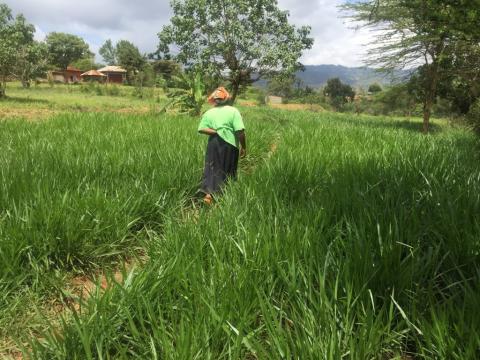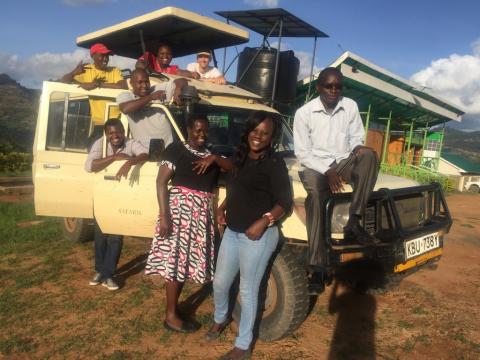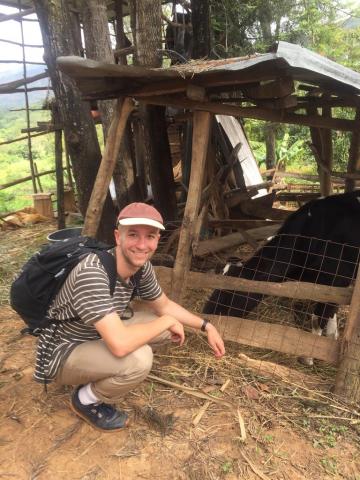Will Summers recently spent a three-month internship in Kenya supported by the Cambridge Global Food Security Travel Fund, working on a research project that aims to help dairy farmers with increasingly challenging production demands. Here he reports on the state of dairy farming and the impact that Brachiaria, a novel feed crop, could have moving into the future.
Milk production is a cornerstone of the agricultural economy in Kenya; responsible for almost 4% of the country’s total GDP. It also plays a key role in poverty alleviation by providing food production, nutritional security and increasing household incomes. However, the dairy industry faces challenges. With a growing population and demand for dairy products, large increases in productivity must be achieved in the coming decades with limited land space. In addition, this will have to be achieved against the backdrop of climate change.
Feeding is generally the largest cost associated with dairy production, while also being a factor that is particularly vulnerable to both seasonal and long term climate changes. Therefore, in 2013 the International Livestock Research Institute (ILRI) launched a project looking to mitigate these threats by introducing a novel fodder grass: Brachiaria. In comparison to grasses traditionally used in East Africa, such as Napier, Brachiaria offers multiple benefits, including improved protein content and enhanced drought tolerance. This means higher yields and better quality feed.

Farmer walking though Brachiaria field (Makueni county, Kenya)
So far it has been shown that Brachiaria can boost milk production in Kenya by up to 40%. However, how this increased productivity translates to farm profit has remained unexplored. Therefore, with the support of the Global Food Security Travel Fund, I spent three months working alongside researchers at ILRI to conduct a pilot study evaluating the changes in farm income since the introduction of Brachiaria in 2013.
Survey data collected from farms in rural regions East of Nairobi proved extremely encouraging. Firstly, as a result of increased productivity, average profit per cow from milk sales increased by 40% between 2013 and 2017. By controlling for inflation and other factors that can influence productivity, such as cattle breed, this showed the direct impact Brachiaria has had on profit. Brachiaria was also found to reduce reliance on purchased feeds, especially during dry seasons, thereby lowering production costs. This meant that the profit margin per litre of milk also increased by 22%. Because of the increased income, farmers reported a growing freedom to make investments, with significant rises in spending on factors ranging from healthcare to farm equipment. Ultimately this led to an increase in household wealth across the farms surveyed, with an asset-based analysis showing that all farmers who occupied the lowest two national wealth quintiles in 2013 had risen out by 2017. Likewise, the proportion of farmers occupying the highest national wealth quintile had grown by approximately 8% between 2013 and 2017.

Survey team after data collection
Collectively, the data highlighted the positive economic impact that Brachiaria can have in Kenya and beyond - alleviating poverty, empowering dairy farmers to invest in assets and providing financial access to services such as education and healthcare. Furthermore, this pilot survey provides a base for similar studies in other areas of Kenya, thus allowing for the success of Brachiaria in specific agro-climatic and socio-economic niches to be examined. Personally, the work also provided extremely valuable opportunities for me to develop skills and knowledge relevant to my career ambitions in agricultural development. Taking the lead in this project, all the way from survey design to data analysis, provided me with a wealth of experiences. Therefore, I would like to thank Cambridge Global Food Security for their support in facilitating this work.

Farm visit during data collection
Will Summers is a PhD student at the Department of Plant Sciences studying arbuscular mycorrhizal symbiosis in cereal crops. His research aims to deepen the understanding of early signalling mechanisms between plant and fungal symbionts, that lead to the successful establishment of colonisation.

